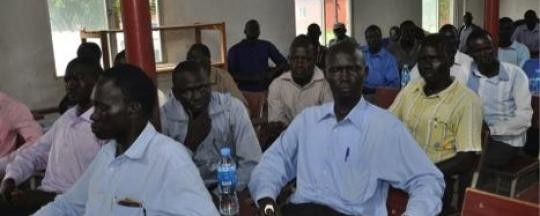The National Ministry of Higher Education in South Sudan has issued an order setting a list of fees structure for all public universities. The 6 October ministerial order argued that the decision was made to avoid the rise in tuition fees becoming burdensome to students and their parents.”
The order requires medical students to pay SSP 3,950 compared to last year when they paid SSP 5,000 , engineering SSP 3,375 ,economics, social sciences, and humanities colleges SSP 1,950 , management sciences SSP 2,245 and law SSP 2,230.
But while the decision appears sympathetic with the conditions of the students and their parents, the university of Juba issued a parallel decision, demanding students in varying colleges to pay higher.
Medical students will pay SSP 15,000 (USD 200) up from SSP 5,000 last academic year 2015/2016. Students of Engineering will pay SSP 12,000, Applied Sciences SSP 9,000 ; economic and social sciences, humanities, and education SSP 6,000 ; law 10,000, and management sciences SSP 8,000.
The purpose of raising the charges, according to John Akec, vice chancellor of University of Juba, is to meet deficit in the budget allocated to the university by the ministry of finance in the annual budget.
The adjustment of the tuition fees, he explained, for the new academic year 2016/2017 is to offset the negative effect of the rising inflation on its operating budget and maintain purchasing power. To operate effectively, the University would need to raise SSP 240 million.
“The Ministry of Finance will provide in its budget this year some SSP 116 million for salaries, and the University of Juba administration plans to raise SSP 79 million through student tuition fees. This would still leave the University with a deficit of SSP 45 million. This means it may not be able to do all the things it needs to do.”
“The University of Juba administration says it finds it difficult to comply with the ministerial order because its implementation would create a deficit of SSP 92 million since there is no mention in the ministerial order how this gap would be bridged. It literally means we will find it extremely difficult to operate and see the academic year through with so low a budget. Everything we purchase to operate has increased 6 to 10 folds, while our income from tuition fees remained the same.”
He continued: “And because we did not have the SSP 4 million to spend per a month, we resorted to drastic cutting down of spending. For example, we suspended the payment of annual air tickets and medical insurance to our international staff. We also cut the hours of electricity on the campus by 5 hours. We froze all maintenance works that were planned to be carried out on engineering, science, and medical labs, and Samani Hall in 2016. That means we could barely afford to pay for a quarter of services we used to purchase in 2015 to keep the University running”.




